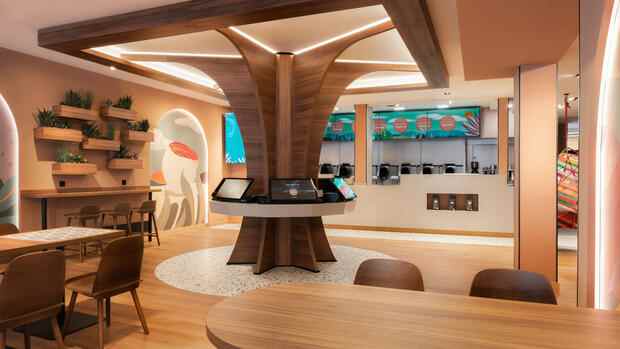At Yaya, everything is digitized: from ordering at the terminal, cashless payment to cooking the dishes.
(Photo: Yaya )
Dusseldorf There are no cooks in the bowl restaurant Yaya in Münster. The automatic kitchen cooks itself. Seven black pots rotate at a 45-degree angle. They were mechanically filled beforehand with ingredients such as chicken, rice and sauce, accurate to the gram. Infrared devices on the side heat the dish to 180 degrees. After a few minutes, the food is poured into a bowl. The pot turns upside down. With hot water from pressure nozzles, it is completely cleaned in a few seconds.
A kitchen worker refines the bowl with lettuce, raw vegetables and grains. The robot kitchen creates up to 120 bowls in various variations per hour. “We can run the restaurant with just two employees, without robots it would need an additional three chefs,” says Dennis Grote, founder of bowl chain Yaya, which recently opened.
The 33-year-old has a lot of experience in gastronomy. With his father Hubertus and brother Kevin he runs Europe’s largest variety group GOP. The seven theaters make half of their sales with food. 800,000 guests cook for GOP-Varietés a year with multi-course menus.
“One major pain point has been the shortage of staff for years. The pandemic has made the problem worse. There is a particular lack of trained and experienced chefs,” Grote complains. When existential worries about GOP arose during the lockdown, he developed an automated system catering concept that requires minimal staffing. “Digitization saves money,” he is convinced.
Top jobs of the day
Find the best jobs now and
be notified by email.
The concept could point the way given the dramatic shortage of employees in the industry. According to a survey by the NGG union of 4,000 employees in the catering industry, only 37 percent can imagine working in the industry for a long time. Low pay, time pressure and working hours in the evenings and at weekends make the professional field unattractive.
“Delegating inhuman activities to machines”
“Not only since today’s critical shortage of staff, restaurateurs are using more and more techniques for which there is no need for a chef and which mean consistent quality for the guest,” states gastro expert Axel Weber from the Soda Group consultancy. He welcomes it when “inhuman activities can be delegated to machines. Who likes to cook pasta at 40 degrees in the basement?” Weber asks. Thanks to robotics, chefs could focus on creative tasks and their role as hosts.
The rotating pots are automatically filled and cleaned.
(Photo: Yaya )
A robot restaurant without people – like two Parisian pizzerias where a robot named Pazzi bakes and serves – is out of the question for Grote. “Hospitable service that makes you feel good remains important.” In any case, staff are needed to refill the ingredients.
>> Read here: A cooking robot is set to conquer Europe’s canteens
The Yaya boss, on the other hand, has largely digitized the processes in his restaurants. The guests put together their desired bowl – with meat or vegan – at the order terminal. Payment is cashless. A few minutes later you will receive your freshly prepared bowl at the serving counter. If you want to avoid waiting around midday, you can order your bowl for a fixed time up to two weeks in advance using the app or on your PC. So far, it’s mainly students who eat at Yaya’s, and Grote wants to recruit office staff.
Most guests use the pick up service. The 50 seats are rarely all occupied. “Ten places would probably be enough if we now roll out the concept as a franchise,” says Grote. There are already various inquiries from truck stops. Yaya himself wants to open restaurants in highly frequented locations such as city centers or train stations.
The founder of the robot restaurant Yaya runs Europe’s largest variety group GOP with his father Hubertus and brother Kevin. 800,000 guests are cooked there every year.
(Photo: Yaya )
Grote is aiming for 50 branches in five years, for which he is currently looking for investors. The Grote family and a private investor have invested 1.5 million euros in the interior design and the development of the robotic kitchen. The cooking robot, which has since been patented, is being built by a mechanical engineer from Ibbenbüren.
A handful of start-ups are working on a robot cook. Da Vinci Kitchen from Leipzig specializes in pasta. The Berlin start-up Aitme is working on a fully automated canteen. Rocket Internet, Food Labs, Vorwerk Ventures and the family office La Famiglia have invested. The vegetable group Bonduelle has developed a salad machine with the Californian start-up Chowbotics. The “Cabaletta” prepares salads in around 1000 variations. And Germany’s first robot bar recently opened in Munich. At Sausalitos, robot Sam mixes a mojito in 30 seconds.
“In a few years it will be common for robots to be in the kitchen,” predicts Yaya founder Grote. “As long as the freshness and quality of the food is right, there is nothing to prevent robots from relieving people in the catering industry.”
More: Despite the crisis, Peter Pane wants to fry more burgers
